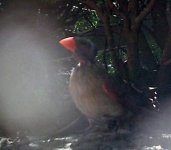Hi All,
Please help me identify this weird bird in Myrtle Beach, SC.
I set up a trail-cam to capture images of a raccoon near the dumpster in our community, and got this instead.
The camera is sitting on the ground. The stems of the shrub in the background are about 2 inches in diameter.
I have a theory, but I don't want to influence you just yet.
Please help me identify this weird bird in Myrtle Beach, SC.
I set up a trail-cam to capture images of a raccoon near the dumpster in our community, and got this instead.
The camera is sitting on the ground. The stems of the shrub in the background are about 2 inches in diameter.
I have a theory, but I don't want to influence you just yet.







